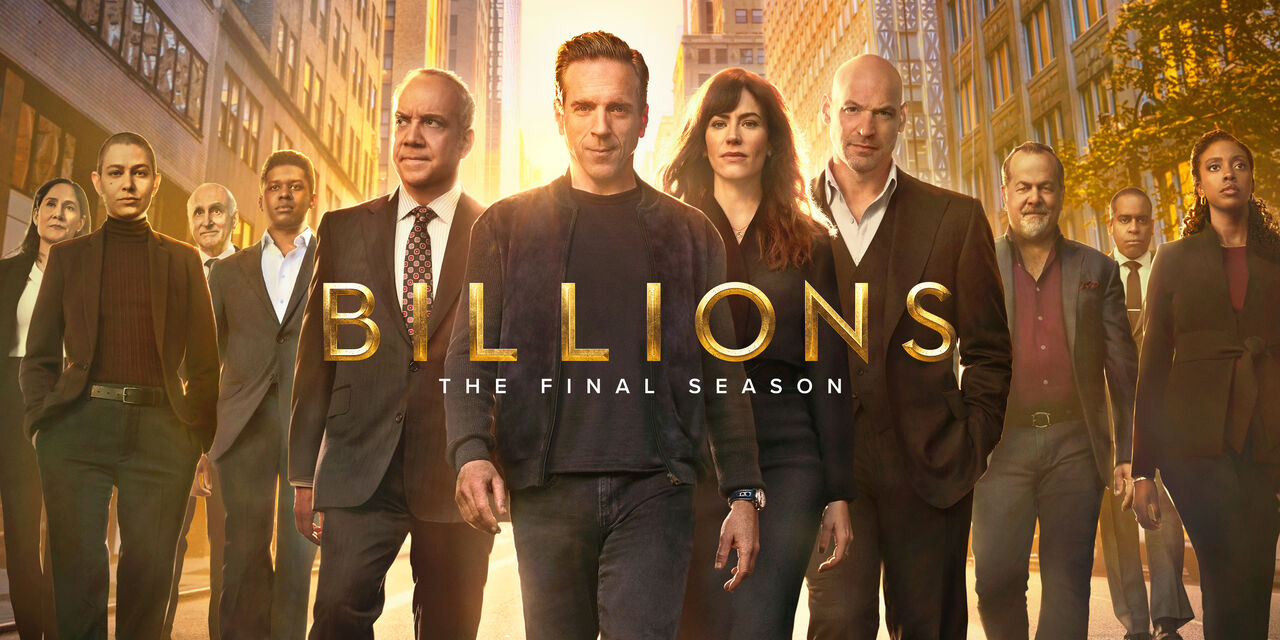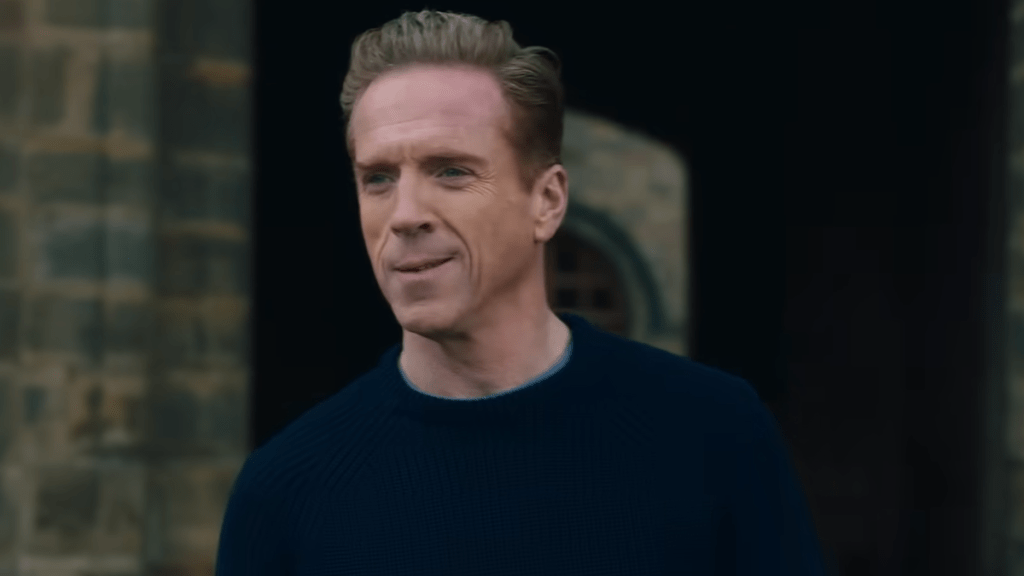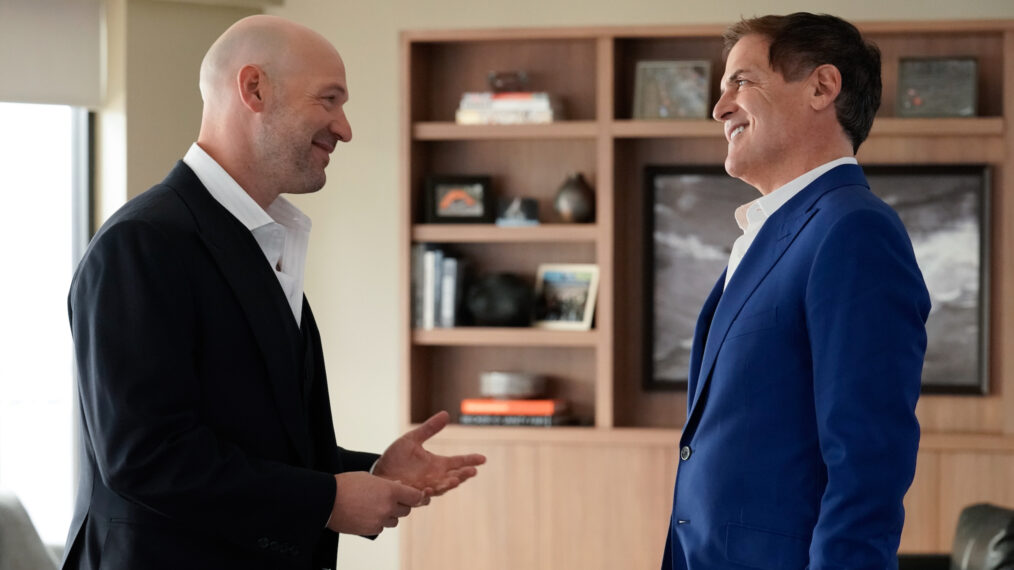CAST: Damian Lewis, Paul Giamatti, Maggie Sif, David Costabile, Dola Rashad, Malin Åkerman, Toby Leonard Moore, Asia Kate Dillon, Corey Stoll, Jeffrey DeMunn, Sakina Jaffrey, Daniel Breaker, Dhruv Maheshwari and Toney Goins
CREATED BY: Brian Koppelman, David Levien, Andrew Ross Sorkin.
Streams on Showtime
Sporting a succinct American accent, precise physical demeanor, and eyes that exude a balance of amusement and wickedness, Damian Lewis’ portrayal of Bobby Axelrod is undeniably one of the standout character innovations in the era of TV. We are genuinely thrilled to witness his return to Billions in its Final Season.
“He’s returned. Bobby Axelrod, the relentless billionaire who played both foe and ally in the initial five seasons of ‘Billions,’ makes a comeback during the premiere of the show’s seventh and last season.
Summoned by his three closest confidantes — Wendy, Wags, and Taylor — Axe (Damian Lewis) emerges from his mandated absence to confront a more malevolent adversary than before. This new antagonist is Mike Prince (Corey Stoll), who stood in Axelrod’s shoes during the sixth season. While Prince introduced a universal basic income program called Mike Money and tried to bring the Olympics to New York City, his methods were questionable. Now, he’s aiming for the U.S. presidency even sooner than expected due to the show’s final season, claiming he alone possesses the insight and determination needed to rescue the nation, regardless of public outcry.
Placing Wendy at the heart of the action like never before, she is the character who perceives with utmost clarity that Prince poses an imminent danger to the republic and the world, openly quoting Hitler. While she pretends to guide him toward the presidency, she secretly aims to undermine him.
Wendy isn’t alone in her mission. To prepare for his upcoming campaign, Prince steps back from the day-to-day activities of Prince Capital. He entrusts Wags and Scooter with vital roles as his representatives and relies on the formidable Kate for legal expertise. Additionally, he sees Taylor and Philip as his successors, entrusting them to run the organization and ensure its financial success.
Yet, Taylor and Philip perceive this as not a promotion, but a calculated dismantling of their initiative, Taylor Mason Carbon, focused on E.S.G. (environmental, social, and governance) investments — a domain once of interest to Mike Prince. For Prince, maintaining a separate entity within his empire suggests indifference to these matters, an image he can’t afford. By merging Taylor and Philip’s venture with the entire operation and placing them, his most brilliant minds, in charge, Prince hopes to achieve two goals simultaneously.
Yet throughout, Wendy, shaken by her unnerving tête-à-tête with Prince where his overwhelming egotism was exposed, is mustering a counterattack. Despite Wags and Orrin Bach’s (Glenn Fleshler) apparent ignorance of Bobby’s whereabouts, Wags discreetly sends a message to his former mentor, Axe. Through a coded pattern recognizable only by an old associate like Taylor’s friend Mafee (Dan Soder), Axe signals his readiness to consider their plea for assistance, facilitated by the finest legal cannabis money can buy in New York.
In a meeting illuminated by the Tower of London’s bright lights, Wendy, Wags, and Taylor are reunited with the series’ long-lost element. Drawing on a 1970s New Hollywood Cinema reference, Bobby Axelrod humorously likens the assembled group to Luke, Leia, and Chewbacca, positioning himself as both Han Solo and the Millennium Falcon. The battle against the antagonist is set to begin.
Simultaneously, a second front opens in the fight against Prince. Although he is down and disgraced to the extent that his adolescent children avoid dining with him in public, Chuck Rhoades remains resolute. Previously, he accepted personal consequences, including legal woes, to assist his colleague Attorney General Dave Mahar of New York (Sakina Jaffrey) in toppling Prince.
But this is Chuck we’re discussing. Would he merely stand by as his reputation is tarnished, leading to his own children’s embarrassment? With the aid of the abrasive journalist Lucien Porter (Matthew Lawler), Chuck orchestrates a PR campaign in the media that portrays him as a modern Robin Hood — the lone figure willing to take tangible action against the billionaire class, enduring two rounds of government job losses as a consequence.
Chuck’s latest strategic move could be his most brilliant one yet, resulting in a complete shift in public perception. Suddenly, his aspirations of garnering support from socialist figures like Bernie Sanders and Alexandria Ocasio-Cortez appear more plausible. While this move might upset Dave and essentially dissolve their nonaggression pact by the end of the episode, Chuck remains undeterred. After all, she didn’t disclose her full plan to him, so why should he reciprocate?
The urgency in “Billions” is revitalized, reminiscent of the intense days of Chuck and Axe’s rivalry. The episode opens with a five-months-later flash-forward where a furious, almost unhinged Prince storms into his workplace, confronts Wendy, and shatters the glass walls of her office, demanding an explanation for her certainty that he shouldn’t become president. In his actions, he inadvertently answers his own question.
Considering the show’s origin before Brexit, Trump, Bernie, A.O.C., and Covid, “Billions” has adeptly kept pace with the changing times. Clancy Brown’s portrayal of the old-school attorney general Jock Jeffcoat and Danny Strong’s portrayal of the sleazy treasury secretary Todd Krakow demonstrated the series’ ability to reflect its environment. However, it’s undeniable that the political and economic landscape of America and the world has evolved in stranger and faster ways than even the most imaginative minds in Hollywood could envision.
Credit goes to the “Billions” team for focusing on a crucial lesson from the past seven years: the super-rich are outsiders and should remain far from the levers of power, much like a chimpanzee shouldn’t be in control of a Ferris wheel. Bringing together characters we favor to stand against the embodiment of undesirable cultural trends — from unchecked oligarchy to superficial progressivism — is remarkably astute. This season’s airing while the writers and actors behind “Billions” protest against Hollywood’s ruling class give the narrative an even more incisive and poignant edge.
For a considerable time, “Billions” has stood as one of television’s most consistently enjoyable series. The show has always chosen to convey its message about the dominating plutocrats of our world within the framework of a finely-crafted financial thriller.
Yet, if the tone of this premiere holds steady throughout the remaining episodes, the series appears to have undergone a significant transformation. It seems to have embraced a new perspective wholeheartedly. In its final moments, the show will delve into the struggles of our protagonists, as well as a substantial number of our antagonists, as they strive to prevent an autocratic billionaire from ascending to the role of the world’s leader.
PS: Don’t miss Mark Cuban’s cameo in the first episode.









